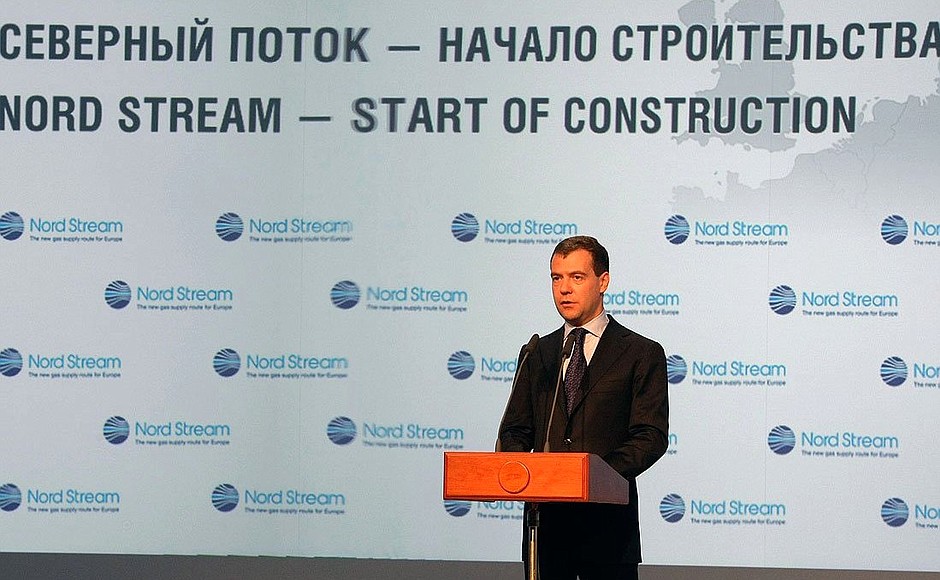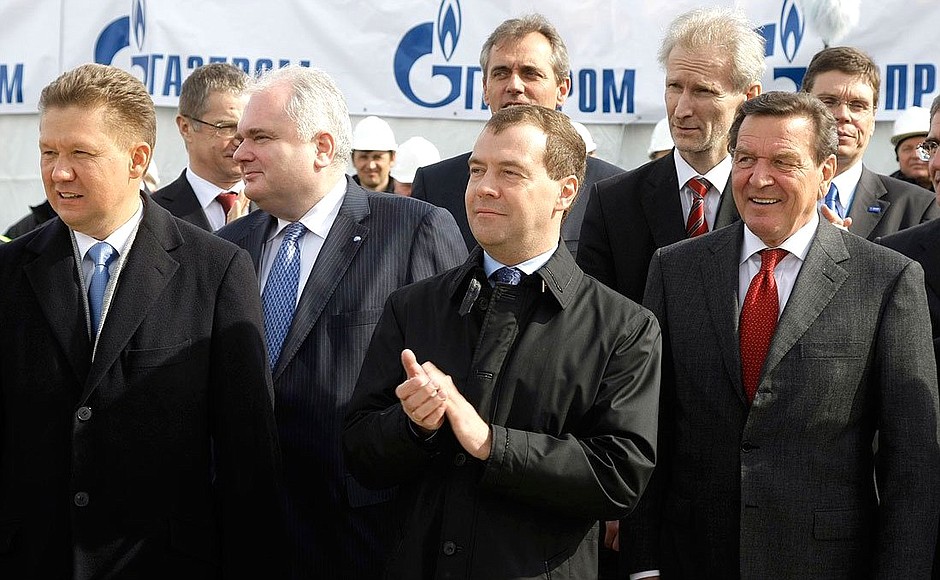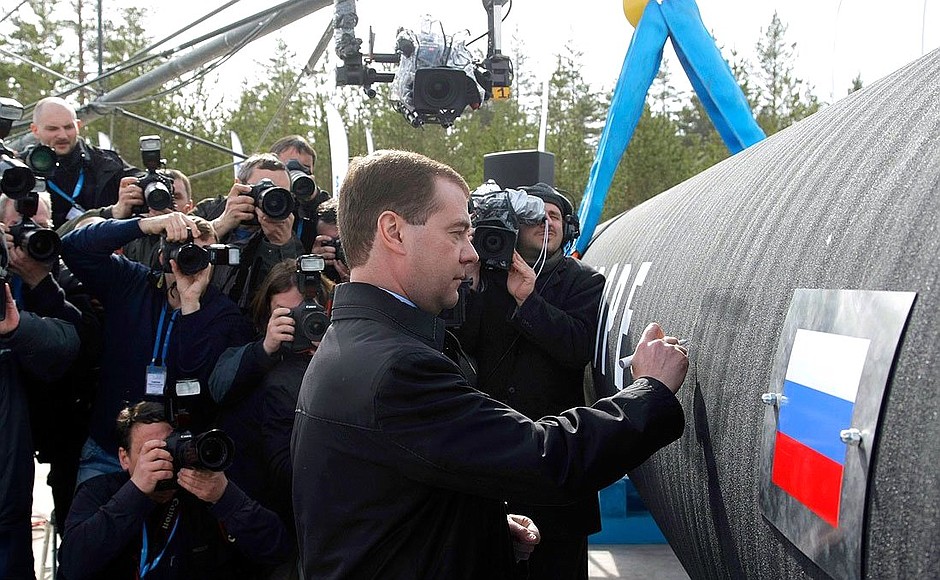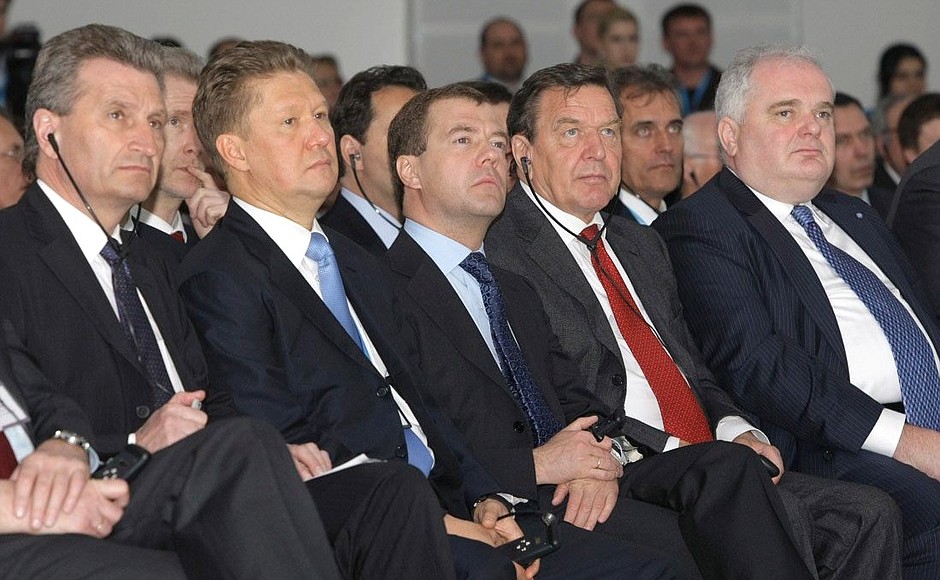The construction process got its official start with the symbolic welding of the Russian and European sections of the gas transport network. The actual process of laying the pipeline across the Baltic Sea bed began on April 6.
The Nord Stream pipeline will open a completely new route for delivering Russian gas to Europe, bypassing transit countries and directly linking Russia’s unified gas supply system to the European Union’s gas transport network. Exports of Russian gas will go to Germany, the Netherlands, Belgium, France, Denmark, the Czech Republic, and the UK.
The pipeline, which will run from Vyborg to Greifswald in eastern Germany, will be 1,223 kilometres in length and able to transport up to 55 billion cubic metres of gas a year. The first pipeline in the twin pipeline project is scheduled to come on line in 2011, and the second line will start operation in 2012. The project operator is Nord Stream AG.
Taking part in the ceremony marking the start of construction were Chairman of the Nord Stream AG Shareholders’ Committee Gerhard Schroeder, Dutch Prime Minister Jan Peter Balkenende, French Secretary of State for Foreign Trade Anne-Marie Idrac, EU Energy Commissioner Gunther Oettinger, and Nord Stream AG Managing Director Matthias Warnig.
* * *
President of Russia Dmitry Medvedev: Colleagues, ladies and gentlemen,
It is a great pleasure to be able to congratulate you personally on this symbolic event – the start of construction of the Nord Stream gas pipeline.
As we know, this gas pipeline will be laid at the bottom of the Baltic Sea and will cross the economic zones of five countries: Russia, Finland, Sweden, Denmark, and Germany. For the first time – and this is perhaps one its greatest achievements – it will make it possible to deliver Russian natural gas directly to Western Europe without passing through transit nations.
Our country has cooperated with its European neighbours in the gas sector for more than 40 years now. This cooperation has fully stood the test of time and I am certain it produces benefits for both sides. It accounts today for more than a quarter of the European Union’s gas consumption. This represents around 140 billion cubic metres of gas a year. Nord Stream will make it possible to deliver an additional 55 billion cubic metres of Russian gas to Germany, UK, France, the Netherlands, Denmark, the Czech Republic, and Belgium.
We are all involved in environmental issues, of course, make environmental concerns our common policy and hold various meetings and conferences, and we are all working on developing alternative energy sources, but demand for gas in Europe is set to grow nonetheless. Of this we are certain as this is logical.
Nord Stream is an example of very effective multilateral energy sector cooperation. It opens up the way to developing transnational energy infrastructure and joint exploitation of gas deposits. This makes it possible in turn to have production facilities operate at their full capacities and, most importantly, create new jobs in Russia, in the European Union, in other European countries.
Nord Stream is not just a big transnational commercial project but is also our contribution to resolving environmental and climatic problems not just at the regional but also the global scale. The preliminary work that went into this project was unprecedented in nature. It was a very lengthy process and it sometimes looked to me as though it would never end. But it has been completed and all necessary precautions have been taken to guarantee that this project is reliable and safe for the environment. This really is a very important aspect. And everything has been done to ensure that the project complies with national and international environmental law.
Increasing the share of natural gas in Europe’s energy balance will make it possible to reduce emissions of pollutants into the atmosphere and, something I particularly want to emphasise, help us to achieve our goals in fighting climate change without detriment to the economy.
Finally, Nord Stream is a key link in guaranteeing global and European energy security. It is an important and systemic part of the energy dialogue between Russia and the European Union, as its special status of trans-European energy network clearly illustrates. This pipeline will ensure reliable gas supplies to European consumers at reasonable and acceptable prices, and it will guarantee us against some of the problems that arise out of shortcomings in the current regulatory base, including that regarding gas transit.
Colleagues, the views of all sides represented here today – state authorities, and companies taking part in the project – were taken into account during the work on settling the legal and technical issues involved. This approach has enabled us to reach what is without question a new level of understanding and trust, and this lays a good foundation for future Russian-European cooperation.
I am sure that the Nord Stream gas pipeline will become a new link binding Russia and Europe. Its construction fits with our long-term goals and – I stress – is also in the interests of our respective national economies’ development. And, of course, it represents our contribution to guaranteeing Europe’s energy security.
I sincerely congratulate everyone on the start of this new stage in the pipeline’s construction.



